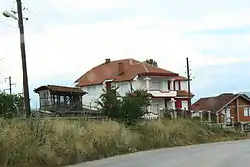Velešta
Velešta (Macedonian: Велешта, Albanian: Veleshtë) is a village in the municipality of Struga, North Macedonia.[1]
Velešta
Велешта Veleshtë | |
|---|---|
Village | |
 Velešta | |
 Velešta Location within North Macedonia | |
| Coordinates: 41°14′26″N 20°38′38″E | |
| Country | |
| Region | |
| Municipality | |
| Elevation | 691 m (2,267 ft) |
| Population (2002) | |
| • Total | 5,834 |
| Time zone | UTC+1 (CET) |
| • Summer (DST) | UTC+2 (CEST) |
| Area code(s) | +38946 |
| Car plates | SU |
| Website | . |
History
Local traditions among Velešta residents hold that the earliest people to settle in the village originated from Debar with the Istrefaj (Istrefllarë) and Vinca (Vojncallarë) families being the first to do so.[2]
In 1900, Vasil Kanchov gathered and compiled statistics on demographics in the area and reported that the village of Veleshta (Велеща) was inhabited by about 1100 Albanian Muslims.[3]
Demographics
The Gheg dialect of the Albanian language is spoken in Velešta.[4]
According to the 2002 census, the village had a total of 5834 inhabitants.[5] Ethnic groups in the village include:[5]
- Albanians 5758
- Macedonians 1
- Romani 1
- Others 74
Sports
Local football club KF Veleshta plays in the Macedonian Third League (Southwest Division).
References
- "Velesta Struga, Macedonia - Velesta Struga | Velesta map". makedonija.name. Retrieved 2016-03-21.
- Tuda, Shpresa (1977). "Të dhëna për zakonet e vdekjes dhe vajtimet në Strugë dhe rrethinë". Gjurmime Albanologjike: Folklor Dhe Etnologji. 5–7: 160. "Pleqtë thonë se veleshtarët e kanë prejardhjen nga Dibra dhe se fiset e para janë: Istrefajt (Istrefllarët), Vinca (Vojncallarët etj. ".
- Vasil Kanchov (1900). Васил Кънчов. „Македония. Етнография и статистика“. София, 1900, стр. 254. (Macedonia: Ethnography and Statistics, p. 254. Accessed 26 May 2019 (in Bulgarian)
- Tuda, Rahmi (1988). "Rreth disa termave filozofikë në vajtimet e fshatrave Veleshtë dhe Shum të Strugës". Gjurmime Albanologjike: Folklor Dhe Etnologji. 18: 211. "Veleshtë (ku flitet gegërishtja)".
- Macedonian Census (2002), Book 5 - Total population according to the Ethnic Affiliation, Mother Tongue and Religion, The State Statistical Office, Skopje, 2002, p. 81.